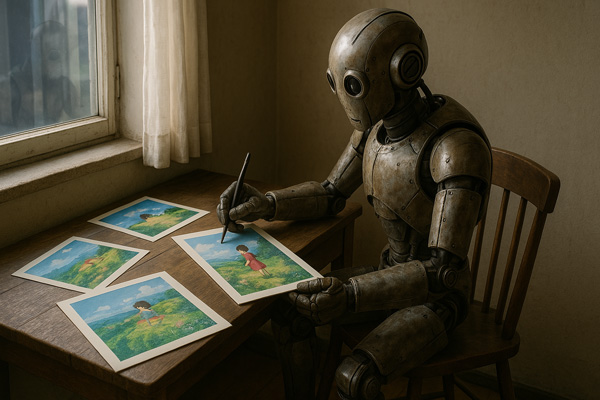ChatGPT drawing Studio Ghibli-style images raises copyright concerns

[Image created by ChatGPT]
As the attention and interest of OpenAI’s new 4o model’s image generation feature surged, concerns over the unauthorised use of Studio Ghibli’s work have also increased.
This model has garnered significant attention due to its high-resolution image generation capability and the intricate details it is capable of expressing.
It is now able to generate hyper- realistic images that are nearly indistinguishable to the human eye.
This has led to another wave of users, putting an immense strain onOpenAI's GPUs.
OpenAI CEO Sam Altman tweeted that they reached a million users within an hour and their GPU can’t handle all the requests saying that the processing volume could be daunting and might delay service and new releases.
The OpenAI 4o model has been trained on enormous datasets to deliver more accurate and lifelike results than previous image-generating AIs, especially for intricate scenes and expressive faces, and has been extensively used in a variety of fields, from advertising to filmmaking and video games.
However, there have been issues regarding the possibility of unauthorized learning from the works of Ghibli, one of Japan’s most iconic animation studios.
A recent trend to create Ghibli-style AI portraits of oneself or Ghibli-style images went viral online.
People change their profile pictures to themselves drawn in Ghibli style.
Even Sam Altman changed his profile picture to an AI-generated image of himself drawn in Ghibli style.
Ghibli Studio productions are highly artistic and culturally valuable and cherished by their own unique style such as Spirited Away and My Neighbor Totoro, which are loved all over the world.
Currently, there is no firm consensus in the debate.
OpenAI says its training data is composed primarily of publicly available information and has been subjected to intense internal review to avoid legal fights.
Nevertheless, many argue that the unauthorized use of Ghibli Studio’s work violates the rights of its creators.
The situation raises the copyright and ethical issues triggered by the evolution of AI technology.
As AI technology continues to evolve at a rapid pace, the issue of unethical use of creative material and transparency and legality in data harvesting is a very contentious issue in society.
"Technological advancements are appreciated but need to be accompanied by respect for art and culture," state experts as they emphasize the necessity for acceptable guidelines and legislation for data use in the future.
The case has also fueled industry-wide discussions on how to balance between technological innovation and protecting creator rights.
"AI technology can serve important functions in creating art and culture, but it also needs to be fairly compensated for the works that it creates," some industry watchers say, calling for self-regulation of data usage and government legislation.
In conclusion, the controversy surrounding OpenAI's 4o model is a reminder of the significance of a balance between technological advancement, ethics, and legal responsibility.
Going forward, OpenAI and the industry should take this as an opportunity to rethink their data scraping policy and copyright issues, seek ways to collaborate with creators fairly and establish definite and fair standards.

- Chaemoon Han / Grade 10
- American School Dhahran

![THE HERALD STUDENT REPORTERS [US]](/assets/images/logo_student_us.png)
![THE HERALD STUDENT REPORTERS [Canada]](/assets/images/logo_student_ca.png)
